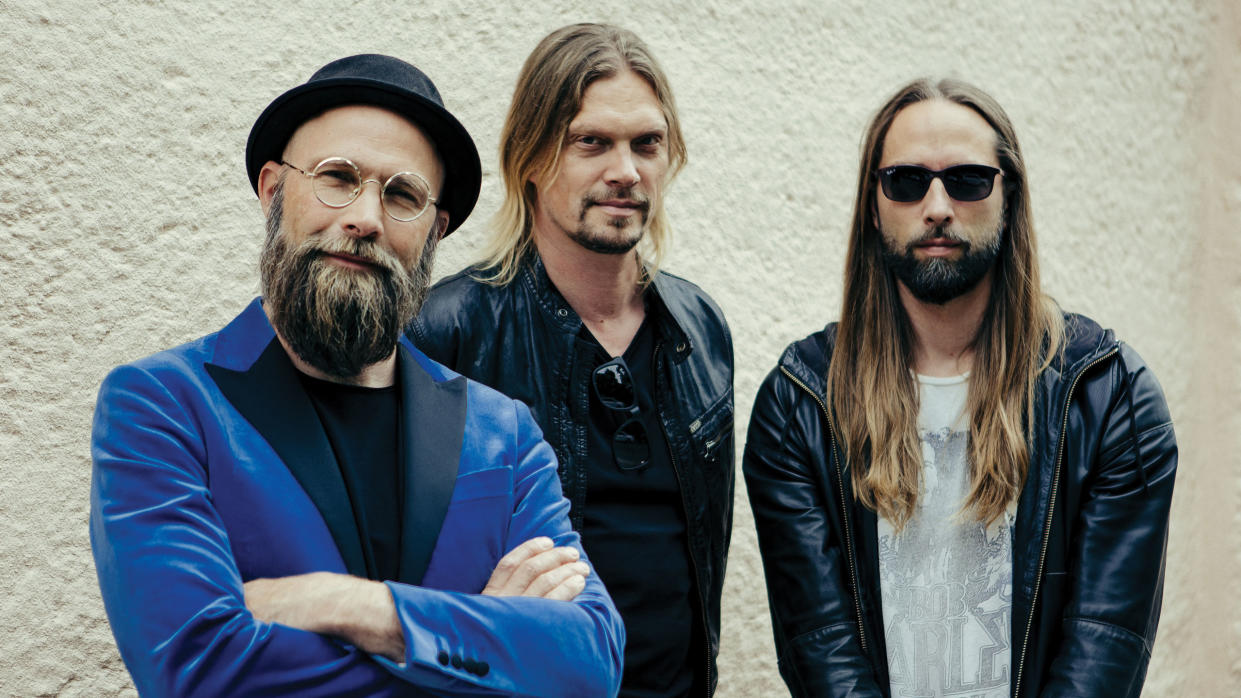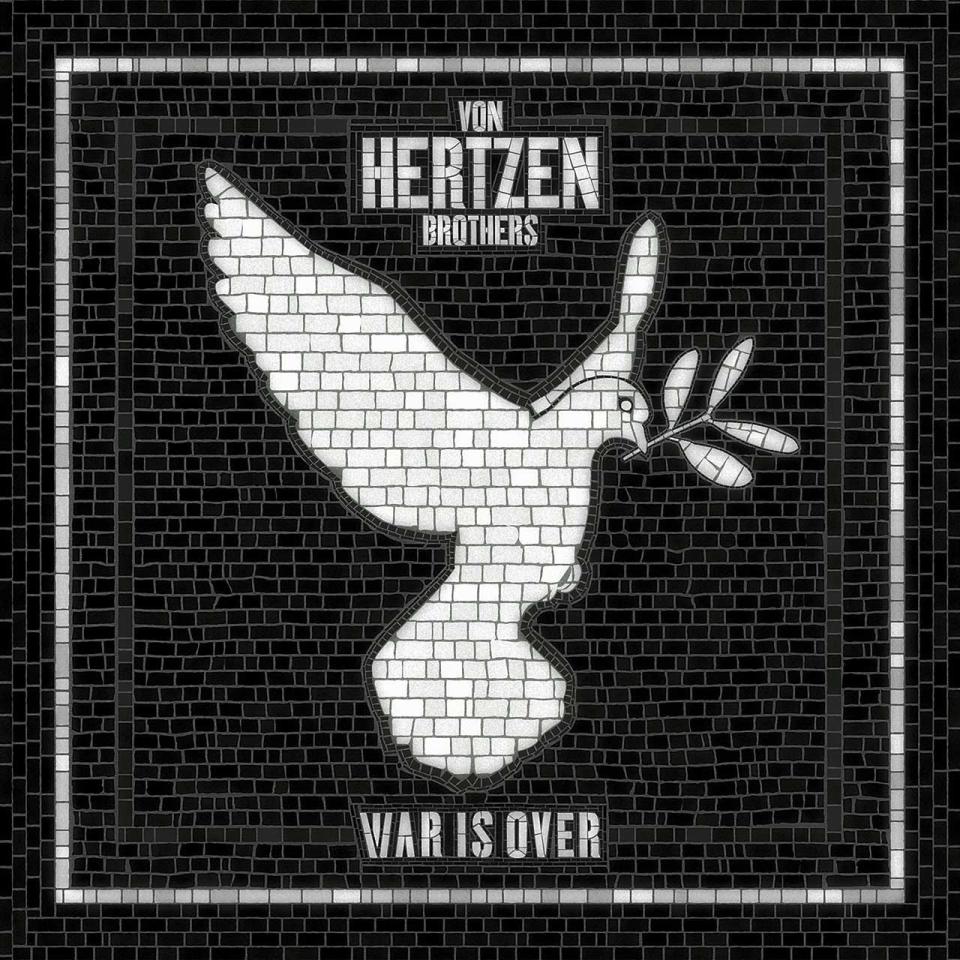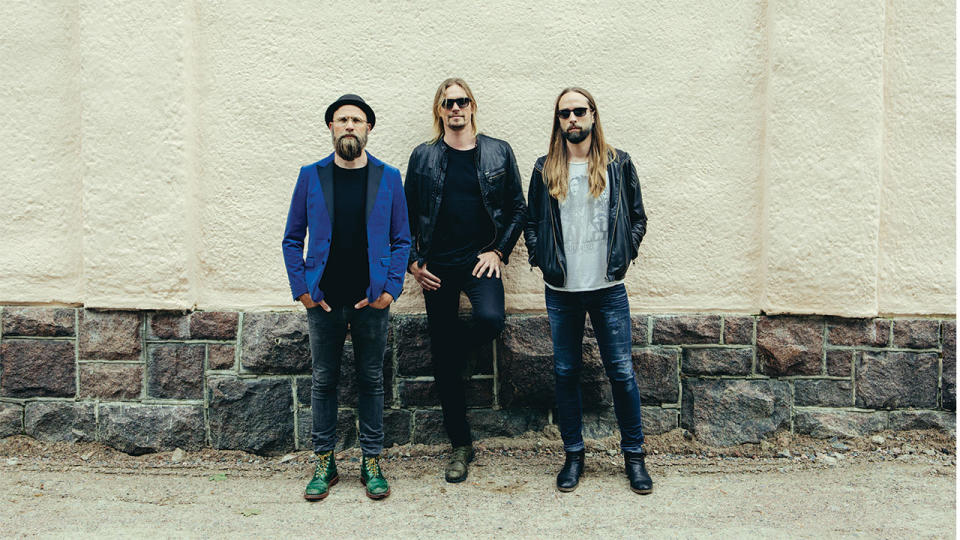“I wouldn’t say we were trying to create another Close To The Edge or A Night At The Opera, but there are definitely some of those elements on the record." The making of the Von Hertzen Brothers' War Is Over

Finnish rockers Von Hertzen Brothers have produced their proggiest album yet in sixth release War Is Over. Prog spoke to frontman Mikko Von Hertzen in 2017 about spiritual enlightenment, band dynamics and political unrest.
If he wasn’t the singer-guitarist in Von Hertzen Brothers, Mikko Von Hertzen could easily pursue a wholly different career as an estate agent. “Do you want to buy this flat? I’m trying to get rid of it,” he says, his sales manner somewhat brusque, of his apartment in Helsinki, when Prog remarks how pleasant said abode looks over Skype.
Particularly appealing is the picture on the wall behind him of nine tigers, the very one that formed the front cover of Von Hertzen Brothers’ acclaimed album Nine Lives, which featured the Prog Award’s 2014 Anthem Of The Year, Flowers And Rust.
“Ah,” he says of the painting by artist Samuli Heimonen. “That’s not for sale.”
Mikko Von Hertzen is unlikely to be giving up his day job any time soon. The band he has been in for 16 years with his brothers – Kie (guitar, vocals) and Jonne (vocals, bass) – are hugely successful in their home country.
Their six albums to date (2001’s Experience, 2006’s Approach, 2008’s Love Remains The Same, 2011’s Stars Aligned, 2013’s Nine Lives and 2015’s New Day Rising) have reached pole position or thereabouts. Meanwhile, Approach won an Emma, the Finnish equivalent of the Mercury Prize, and Nine Lives was also nominated for a Classic Rock award.
They’re somewhere between their nation’s Coldplay and their Radiohead, their three-part harmonies positing them as a sort of Crosby, Stills & Nash meets Mew/Muse. Pretty prog, in other words. In fact, after two albums peddling a sound more in a classic rock vein, they have produced their proggiest collection to date: War Is Over. Mikko reveals that the band had in mind prog masterworks such as Yes’ Close To The Edge and Queen’s A Night At The Opera while working on it.
“Those records had a big impact on us,” he says. “I wouldn’t say we were trying to create another Close To The Edge or A Night At The Opera, but there are definitely some of those elements on the record, some of the epic ideas and songs with twists and turns.”

The three brothers wrote the album in a summer cottage outside Helsinki, "a beautiful place in the inner archipelago of the Eastern Sea” where they used to spend their childhood summers. In that atmosphere of peace and quiet, they conjured War Is Over, all surging dynamics and raging sonics.
The album was produced by all three brothers: each produced their own songs. It was a mainly Von Hertzen affair, although Janne ‘Burton’ Puurtinen of Finnish rockers HIM makes a cameo on keyboards, while old friend Sami Kuoppamäki – who has drummed for Finnish metal giants Apocalyptica and Stratovarius, and also played on Approach – returned to the VHB fold.
Mikko describes the expansive and layered War Is Over as “our most musically ambitious album to date”. It has a political bias inspired (term used advisedly) by the way “the social tensions in the Western world, the structural changes due to the European refugee crisis, not to mention the growing inequality, protectionism and flourishing hate speech, have hit the world with a force so strong it becomes impossible for them not to affect your art”.
War Is Over isn’t a concept album as such – Mikko sees it as “individual paintings on a wall that touch on the subject of peace” – but it does have conceptual heft. And it opens with the anthemic 12-minute title track, a barrage of pyrotechnics and shifts of tempo and dynamics.
“For me, prog is beauty and epicness,” Mikko declares. “It’s something that deals with phenomena beyond what we see with our eyes. It’s experiencing something beautiful and big. Love, maybe? That’s the prog I can advocate for.
“We do have songs that are long, but they’re not long because we want to be prog,” he reasons. “We don’t want to be anything other than a good band.”
VHB have a prog pedigree that stretches to their choice of cover versions, which include Queen’s Don’t Stop Me Now and King Crimson’s 21st Century Schizoid Man.
“I heard that Crimson – not [Robert] Fripp but two other guys in the band – heard it and really liked it,” Mikko says of VHB’s cover. “I think we did a good job on that song, although we messed with the original idea by adding three-part harmonies to the verses.”
There is a harmonic element to VHB’s progressive rock, and to the brothers’ relationship: Mikko laughs when Prog asks which rock siblings they have most in common with, saying, “Definitely not the Gallaghers.” Kie (47), Mikko (45) and Jonne (40) grew up in a home where music played a powerful role: their parents met in the choir and their dad, a businessman who used to play guitar in bands in the 60s, would travel the world and bring back musical presents, in the form of vinyl, for his sons. This is how they acquired their stack of Eagles, ZZ Top, Allman Brothers, Beatles, Pink Floyd, Queen and Led Zeppelin records.
“We’d pretend to be rock stars – that’s how we started,” Mikko recalls.
At Sibelius High School in Helsinki, the brothers formed a prog outfit, which foundered when Kie was invited to join Don Huonot, who became the country’s biggest band of the late 90s, with triple-platinum albums and festival headlining slots. Meanwhile, Mikko and Jonne had stints in Egotrippi and Cosmos Tango before the seeds of VHB were sown at their father’s 50th birthday party in 1995. There, they performed together as a surprise, playing assorted classic rock numbers by the likes of Hendrix and Cream.

In 1998, Mikko wound up in India, drawn by an interest in Eastern philosophy and a sense that he needed to change, to improve himself, from within. Having lived the rock’n’roll lifestyle from an early age, it was a case of been there, done that – time to move on.
“We’ve all pretty much experienced everything there is to experience,” he reveals of himself and his brothers today, fiddling with his mane of hair, which he does a lot. “We’re all in our 40s so the partying aspect and all that stupid stuff is almost non‑existent now. We have a strong work ethic – people pay for their tickets so we don’t want to turn up and piss in their mouth. The Gallaghers can do that. We don’t want to.”
Did he have a piss-in-mouth phase?
“Before getting into all that spiritual stuff [in India] I have to say I wasn’t feeling very well about myself,” he admits. “There was certainly a time when I was touring with my previous bands in the mid-to-late 90s when I was a fucking prick, you know, a stupid guy, fully exploring that side of things. I was messing gigs up because I was too drunk, and when you’re a kid and getting attention from the girls…. Drugs were never a big thing for me, but there was a lot of tequila. But then I realised that’s not me. That wasn’t even close to where I wanted to be.”
Was it like a Damascene conversion?
“I was never into any religion,” he replies, “but I do remember watching movies as a kid and there would always be a Tibetan monk in them, and he’d be so quiet and poised and his eyes would be so shiny… I wanted to be like that!” he says.
Prog is unfamiliar with this esoteric strain of monk-heavy Finnish cinema, but still, this is getting interesting.
“I wanted my mind to be still and to have a peaceful existence,” he furthers. “What, I wondered, are the steps I need to take to be like that? I had to train myself towards that. I needed to be less self‑centred and arrogant. Less of a fucking prick.”
Mikko spent seven years living in an ashram with the spiritual guru and leader Amma, also known as The Hugging Saint, doing volunteer work and studying to become a more evolved, spiritual human being. Then, around the turn of the century, he contacted his brothers back home and suggested they form a band. Immediately, they flew over and spent two weeks working on a batch of songs that became the first VHB album, Experience.
They soon discovered, to their delight, that theirs was not a fractious alliance.
“We’re smart and we gained our success in previous bands so we’re not egotistical or fighting to be in the limelight or to get our ideas through,” Mikko notes. “We learned long ago that the best thing is to allow each other the space and freedom to bring our ideas to the band.”
They also discovered that they each bring something unique to the table when they’re writing songs.
“I’m the pop guy – I write poppy melodies,” the singer-guitarist explains. “Kie writes cinematic-type stuff, and Jonne is the artistic one, so his ideas are very advanced.”
To further hone this distinction between the three brothers, Prog feels it’s time to employ the trusty Nirvana analogy.
“I’m the Dave Grohl because I used to play the drums and was quite successful till I started providing vocals for VHB which, I have to stress, I never wanted to do – I never wanted to be a singer.
“But,” he adds, “I was always the most extroverted one out of the three of us, which is why it’s me talking to you now.”
Whereas Jonne is the quietly methodical one – the Krist Novoselic – and Kie is the Kurt Cobain.
“Definitely. Out of the three of us, he’s the rebel, the angst-ridden one, the total genius,” he says. “But with genius, as you know, comes all sorts of moods and stuff.”
Who’s the band pin-up?
“I don’t think there is one,” he says. “There’s no pussy magnet in this band. Come on, we’re prog!”
They are indeed. On their latest album, the band – who have toured with everyone from Foo Fighters, Neil Young, Biffy Clyro and ZZ Top to 30 Seconds To Mars, The Wildhearts, Anathema and Opeth – have created what is arguably their most conceptually coherent work to date. Now all they’ve got to do is survive the impending apocalypse so they can enjoy it: a fear of war and a genuine desire for peace are its leitmotifs.
“We are very worried about the world and how people are reacting to changed circumstances,” says Mikko, who describes himself as a “spiritual aspirant”.
He acknowledges the increased tensions in the world brought about by, among other things, the refugee crisis, Brexit and Trump.
“You can feel the threat,” he says. “We need to get rid of that and start to give out peaceful feelings. Finland has been a very safe country, and statistically it still is, but there have been terrorist attacks here, and there is real polarity, which wasn’t the case 10 years ago. So it’s not that we’re trying to be political with this album – it’s just that the world we live in seeps into the music. There is, as a result, a lot of confusion and yearning in the lyrics.”
It might be suffused with present tension; nevertheless, War Is Over is, according to Mikko, a loose, live-sounding, joyful affair, brimming with the fury of the righteous.
“People have told me this is a very dark album, and I don’t disagree, but there’s always hope in our music,” he argues.
Unlike some of their Scandinavian black metal peers, VHB don’t indulge in occult rituals in the dead of night. Quite the opposite.
“We’re the soldiers of light,” he decides. “In Tolkien terms, we’re the elves: the ones in white robes.”
A force for good in the world? Was that the idea: to create a piece of music that would provide light in a dark time?
“That was the idea – that’s always the idea,” says Mikko, who does have a dark secret: he loves early-70s pop duo The Carpenters, as well as 90s girl group All Saints, which he duly demonstrates by warbling every last word of their 2000 hit Black Coffee to Prog over Skype. Oh, and he hates metal. (“I can’t stand it. I just want to listen to Goldfrapp and nice Indian flute music.”)
“I don’t believe that darkness and fear and the negative are things we should give room to,” he proclaims, finally. “We should find a way to nourish the good within us, like compassion, understanding and love. All those things I feel humanity is about. Human beings should somehow differ from the beasts of the world.
“We have a special gift: the art of discrimination between good and evil. There’s a saying: ‘If you feed the wolf in you, the wolf will win, but if you feed the dove of peace, she will fly.’
“Or,” he says, laughing at the portentousness of his oratory, “something like that.”

